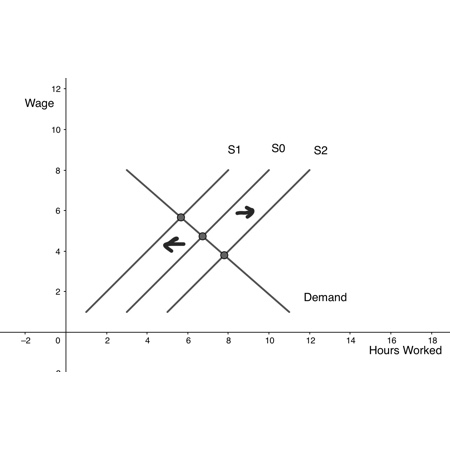The China Factor: How Market Shifts Affect BMW, Porsche, And Other Automakers

Table of Contents
The Rise of Chinese Consumers and Changing Preferences
The explosive growth of China's middle class has dramatically increased the demand for luxury cars, creating a lucrative market for brands like BMW and Porsche. However, simply having a presence isn't enough; understanding evolving Chinese consumer preferences is paramount. This involves acknowledging a significant shift away from traditional sedans towards larger vehicles, particularly SUVs. This preference for spaciousness reflects changing lifestyles and family structures within China.
- Increased purchasing power: The rising disposable income of Chinese consumers directly translates to higher luxury car sales, making China a key market for premium automakers.
- Shift towards SUVs: The demand for SUVs has outpaced sedan sales significantly, forcing automakers to adjust their production strategies and prioritize SUV models for the Chinese market.
- Growing preference for Electric Vehicles (EVs): Chinese consumers are increasingly embracing electric and new energy vehicles (NEVs), driven by government incentives and environmental awareness. This necessitates significant investment in EV technology and infrastructure by foreign automakers.
- Technological advancements: Chinese consumers are highly tech-savvy, demanding advanced features like advanced driver-assistance systems (ADAS), connectivity, and in-car entertainment systems. These expectations influence the design and development of vehicles targeted at this market.
Government Regulations and Policies: Navigating the Chinese Automotive Landscape
The Chinese government plays a significant role in shaping the automotive landscape through its policies and regulations. These influence everything from vehicle production to market access. Navigating this complex regulatory environment is crucial for foreign automakers seeking success in China.
- Stricter Emission Standards: China's commitment to reducing carbon emissions has led to increasingly stringent emission standards, forcing automakers to invest in cleaner technologies and develop more fuel-efficient or electric vehicles.
- NEV Subsidies and Incentives: Government subsidies and tax breaks for new energy vehicles (NEVs) significantly impact market penetration and incentivize consumer adoption of electric cars.
- Import Tariffs and Trade Policies: Trade wars and fluctuating import tariffs can significantly impact the profitability and pricing strategies of foreign automakers operating within the Chinese market. International trade relations are therefore a key consideration.
- Localization Requirements: Chinese regulations often mandate a certain level of local production and partnerships, requiring foreign companies to establish manufacturing facilities or collaborate with domestic firms.
Supply Chain Disruptions and Geopolitical Factors
Global supply chain disruptions, exacerbated by factors like semiconductor shortages and geopolitical instability, present significant challenges to automakers operating in China. The reliance on Chinese manufacturers for certain components and raw materials adds another layer of complexity.
- Raw Material Sourcing: China's role as a major supplier of raw materials for automotive manufacturing exposes automakers to potential disruptions in the global supply chain.
- Semiconductor Shortages: The global chip shortage has repeatedly hampered vehicle production worldwide, impacting both domestic and international automakers operating in China.
- Geopolitical Risks: Trade tensions and geopolitical uncertainties can disrupt trade relationships and access to the Chinese market, impacting production and distribution.
- Supply Chain Diversification: To mitigate risks, automakers are increasingly focusing on diversifying their supply chains and reducing their reliance on single sources of components and raw materials.
BMW and Porsche's Specific Responses to the China Factor
BMW and Porsche, being major players in the luxury car segment, have implemented specific strategies to navigate the challenges and capitalize on the opportunities presented by The China Factor.
- BMW's localization strategy: BMW has invested heavily in local production facilities and R&D in China to cater to the specific needs and preferences of the Chinese market.
- Porsche's targeted marketing: Porsche has tailored its marketing campaigns to appeal to specific segments of the Chinese consumer market, leveraging digital channels and emphasizing brand prestige.
- Product Adaptation: Both brands have adapted their vehicle offerings to meet the unique demands of Chinese consumers, incorporating features and specifications tailored to local preferences.
- Competitive advantage: By actively adapting and investing, these brands aim to maintain a competitive edge against both domestic and international rivals in the rapidly evolving Chinese automotive market.
Conclusion
The China Factor is undeniable. The Chinese automotive market's rapid growth, evolving consumer preferences, and intricate government policies are reshaping the global automotive industry. Automakers like BMW and Porsche must adapt to these shifts strategically to maintain competitiveness. Understanding The China Factor is crucial for anyone involved in the automotive industry. Stay informed on the latest developments in the Chinese market and adapt your strategies accordingly to navigate this dynamic landscape and thrive in the future of automotive manufacturing and sales. Learn more about the impact of The China Factor and how it will affect your business.

Featured Posts
-
 Hart Trophy Finalists Announced Draisaitl Hellebuyck And Kucherov
May 10, 2025
Hart Trophy Finalists Announced Draisaitl Hellebuyck And Kucherov
May 10, 2025 -
 White House Cocaine Secret Service Wraps Up Investigation
May 10, 2025
White House Cocaine Secret Service Wraps Up Investigation
May 10, 2025 -
 Families Furious After Nhs Staff Accessed A And E Records Of Nottingham Stabbing Victims
May 10, 2025
Families Furious After Nhs Staff Accessed A And E Records Of Nottingham Stabbing Victims
May 10, 2025 -
 Perus Emergency Mining Ban A 200 Million Blow To Gold Production
May 10, 2025
Perus Emergency Mining Ban A 200 Million Blow To Gold Production
May 10, 2025 -
 Real Id Enforcement What You Need To Know For Summer Travel
May 10, 2025
Real Id Enforcement What You Need To Know For Summer Travel
May 10, 2025
